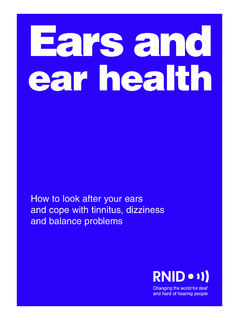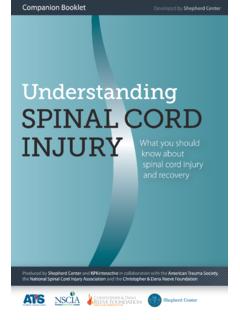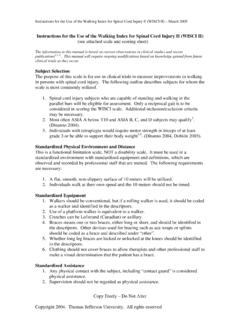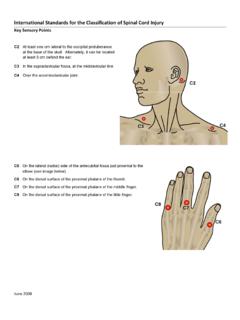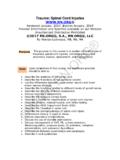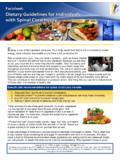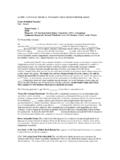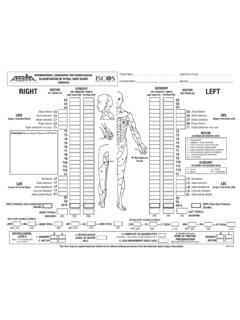Transcription of BOWEL MANAGEMENT FOLLOWING SPINAL …
1 3. NATIONAL SPINAL INJURIES CENTRE. SPINAL OUTPATIENT SERVICES. STOKE MANDEVILLE HOSPITAL. BOWEL MANAGEMENT . FOLLOWING SPINAL cord I NJURY. Maureen Coggrave, RN, MSc Nursing Research Fellow NSIC. Anne McCreath, RGN. Deputy Sister SPINAL Outpatient Services May 2007. BOWEL handout /May07/SPOP/BS. Establishing an effective BOWEL MANAGEMENT programme after SPINAL cord injury is essential for the future well being of each individual. If this is not achieved there is a likelihood of faecal incontinence, which will interfere with an individual's physical, psychological, social, recreational and sexual function. Many SPINAL cord injured clients have said that after loss of mobility, loss of BOWEL control is the next most distressing aspect of SCI. The way the BOWEL is managed can be called managed continence' the aim is not only to ensure adequate BOWEL emptying but to achieve control over BOWEL function.
2 1. Normal Defaecation Defaecation is both an involuntary and voluntary process which is controlled by the SPINAL cord and the brain. The sigmoid colon is the storage area for stool and the rectum is usually empty until just before defaecation. When stool is pushed through from the sigmoid colon to the rectum the increased pressure and distension cause sensory impulses to initiate reflex impulses in the internal anal sphincter and muscle of the rectum, and the urge to open the BOWEL reaches consciousness. The internal sphincter relaxes and the rectum contracts, moving the stool to the anal canal .If the urge to defaecate is acted on, the external sphincter is voluntarily relaxed and the stool is expelled. If the urge to defaecate is inconvenient, the external sphincter remains closed and the urge to defaecate soon wanes.
3 The nerves which provide sensation and both voluntary and involuntary motor control of the anal canal arise from the sacral (S)2, S3, S4 nerve Any SPINAL cord injury at this level or above will cause damage to the nervous control of defaecation. Transverse colon Ascending colon Descending colon Small BOWEL Sigmoid colon Appendix Rectum Anal canal (internal and external anal sphincters). MJC/AM updated May 2007 2. 2. BOWEL function after SPINAL cord injury After a complete SPINAL cord injury the descending input from the brain to the colon and ano-rectum is lost. These changes result in the loss of sensation of the need for defaecation, loss of voluntary control of defaecation and loss of the brain's influence over reflex activity. The enteric nervous system, which lies within the walls of the colon, remains functionally intact.
4 Therefore peristalsis continues, but without the co-ordination from the brain and SPINAL cord it is less effective, and colonic transit time can be extended to around 80 hours on average. This is an increase of approximately 50 hours above the average for the able bodied population and this extended time in the colon results in a drier stool and an increased likelihood of constipation. Other effects on the BOWEL depend on the part of the SPINAL cord that is damaged. When SPINAL shock has resolved, one of two types of neurogenic BOWEL may develop. Reflex BOWEL Injuries to the twelfth thoracic vertebra (T12) and above result in what is known as a reflex BOWEL '. Injuries at this level result in damage to upper motor neurons (lying within the SPINAL cord ) leaving the reflex arc from the cord to the colon and ano- rectum intact.
5 This remaining reflex activity can be utilised for effective BOWEL MANAGEMENT . By stimulating the rectum the BOWEL may push faeces from the rectum through reflex contraction, reducing the need for aperients or manual evacuation. This reflex activity can be triggered using a gloved lubricated finger to stimulate the rectum (see ano- rectal stimulation below ), or by the insertion of a suppository or micro enema, or both conbined. It is then advisable for the SCI individual or his carer to check that the rectum is empty to prevent embarrassing accidents occurring later on. It is advisable to aim for a soft formed stool which is easier for the rectum to expel (Bristol Scale 4 . see page 19). Flaccid BOWEL Injuries to the first lumbar vertebra (LI) and below result in a flaccid BOWEL with a lax anal sphincter and pelvic floor.
6 Injuries at this level damage the reflex arcs between the SPINAL cord and the colon and ano-rectum and the reflex activity of the BOWEL is lost. This results in slow stool propulsion through the descending and sigmoid colon and a high risk of faecal incontinence through the lax anal sphincter. The MANAGEMENT for this type of BOWEL is based on a manual evacuation of the stool, therefore a slightly firmer stool which is easier to remove digitally is advised (Bristol Scale 3). MJC/AM updated May 2007 3. Where the SCI is incomplete remaining BOWEL function may not fit neatly into these definitions. It is important therefore to base BOWEL MANAGEMENT on individual assessment. 3. Aims of BOWEL MANAGEMENT The changes in BOWEL function FOLLOWING SCI mean that there is a need to actively manage the BOWEL managed continence - the main aims being to: Achieve regular and predictable emptying of the BOWEL at a socially acceptable time and place Avoid constipation, faecal incontinence and Autonomic Dysreflexia Complete BOWEL MANAGEMENT within a reasonable time ideally up to one hour Use minimum necessary physical or pharmacological interventions Maintain short and long term gastrointestinal health.
7 The overall aim of BOWEL training is to enable the SCI individual to be in control of his BOWEL function, independently or through a carer, and to promote his reintegration into society. The individual requiring assistance must give his consent for any intervention, usually verbally. This supports the individual's right to self-determination and autonomy (RCN 2000). 4. Factors Affecting BOWEL MANAGEMENT BOWEL MANAGEMENT will be affected by various factors including: Previous medical history, particularly any pre-existing BOWEL condition Pre injury BOWEL habit Current medication, which may affect BOWEL activity The level of injury whether the patient has a reflex or flaccid BOWEL Psychological and emotional factors It is important to be aware that some SCI individuals disassociate themselves from their BOWEL care as it can be an embarrassing topic to discuss and to manage, especially, but not only, in the weeks immediately FOLLOWING injury .
8 However, the SCI individual should realize that by taking control of their own BOWEL MANAGEMENT they can retain greater dignity and independence. Lifestyle It is important for BOWEL MANAGEMENT to suit the lifestyle of the individual and factors such as working patterns and cultural issues should be taken into consideration when planning BOWEL care. MJC/AM updated May 2007 4. 5. Moving Stool Through the BOWEL A major aspect of BOWEL MANAGEMENT FOLLOWING SPINAL cord injury focuses on methods to encourage the movement of stool through the BOWEL . This can be aided by the FOLLOWING : Exercise and activity Physical activity helps to promote peristalsis in the colon, which in turn helps to keep stools moving. SCI individuals should carry out as much of their own care as possible, such as transferring and pushing, bathing and dressing, as these activities help to provide daily exercise, thereby helping to move the stool through the colon and avoid constipation.
9 Other activities such as passive movements, stretching and using a standing frame can also be beneficial and can be timed to help with BOWEL MANAGEMENT . Diet and fluid intake Diet is of vital importance in achieving successful BOWEL MANAGEMENT as both what is eaten and when, has a major effect on BOWEL function. It is important to eat a balanced diet which is rich in fruit, vegetables, bread and cereals, to ensure an adequate fibre intake. Fibre holds water and adds bulk to the stool, which aids the movement of the stool through the BOWEL . Excessive amounts of fibre should, however, be avoided and raw bran is no longer recommended. Diet should also contain a moderate amount of dairy products, meat, fish or pulses. Foods containing fats and sugars should only be consumed in small amounts.
10 It can be useful to note foods which have a marked effect on the BOWEL and which may need to be avoided. However, these foods can be used positively to help in BOWEL MANAGEMENT . prunes, figs etc Another important aspect of the diet is when the meals are taken. Meals should be taken at regular times throughout the day to keep the digestive process working thus helping to prevent flatulence and bloating. It is also essential to have an adequate daily fluid intake in order to avoid constipation. The body should be well hydrated in order to prevent too much absorption of water by the colon, which results in a hard, dry stool. A fluid intake of at least 2 litres daily is recommended made up mostly of water. This may need to be adjusted where bladder MANAGEMENT or other medical conditions dictate.
